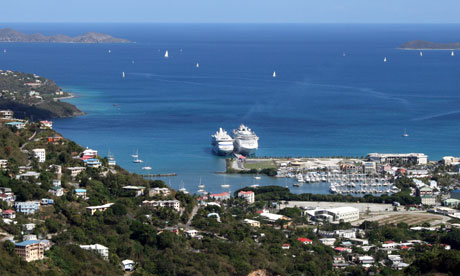Records represent the biggest stockpile of inside information about the offshore system ever obtained by a media organisation

The British Virgin Islands, the world's leading offshore haven. Photograph: Lars Ruecker/Getty Images/Flickr RF
The secret records obtained by ICIJ lay bare an extraordinary range of people using offshore hideaways.
They include US dentists and middle-class Greek villagers as well as families of despots, Wall Street swindlers, eastern European and Indonesian billionaires, Russian executives, international arms dealers and a company alleged to be a front for Iran's nuclear-development programme.
The leaks illustrate how offshore financial secrecy has aggressively spread around the globe. The records detail offshore holdings in more than 170 territories; this represents the biggest stockpile of inside information about the offshore system ever obtained by a media organisation.
To analyse it, ICIJ collaborated with reporters from the Guardian and the BBC in the UK, Le Monde in France, Süddeutsche Zeitung and Norddeutscher Rundfunk in Germany, The Washington Post, the Canadian Broadcasting Corporation (CBC) and 31 other international media partners.
Eighty-six journalists from 46 countries used both hi-tech data crunching and traditional reporting to sift through emails and account ledgers covering nearly 30 years.
"I've never seen anything like this. This secret world has finally been revealed," said Arthur Cockfield, a law professor at Queen's University in Canada, during an interview with CBC.
Offshore's defenders say that most users are legitimate. Offshore centres, they say, allow people to diversify investments, create international ventures and do business in entrepreneur-friendly zones without red tape.
"Everything is much more geared toward business," David Marchant, publisher of OffshoreAlert, an online journal, said. "If you're dishonest, you can take advantage of that in a bad way. But if you're honest you can take advantage of that in a good way"
The vast tide of offshore money can disrupt economies. Greece's fiscal disaster was exacerbated by offshore tax cheating and in the Cyprus crisis, local banks' assets were inflated by waves of cash from Russia.
ICIJ's 15-month investigation found that, alongside perfectly legal transactions, the secrecy and lax oversight offered by the offshore world appears to allow fraud, tax-dodging and political corruption to thrive.
Anti-corruption campaigners argue that offshore secrecy forces citizens to pay higher taxes to make up for vanishing revenues, while anonymity makes it difficult to track the flow of money. A study by James S Henry, former chief economist at McKinsey & Company, estimates that wealthy individuals have $21-$32tn tucked away in offshore havens – roughly equivalent to the size of the US and Japanese economies combined. The offshore world is growing, said Henry, who is a board member of the Tax Justice Network, an advocacy group critical of offshore havens.
Much of ICIJ's analysis focused on the work of two major offshore incorporation firms, Portcullis TrustNet and Commonwealth Trust Limited (CTL). Trustnet was founded by Mike Mitchell, a New Zealand lawyer who worked as the Cook Islands' solicitor general in the early 1980s, built up offshore business in Hong Kong, and sold out in 2004 to Singapore lawyer David Chong, as Singapore became a favoured financial hideaway for clients from Asia.
Canadian businessman Tom Ward and Texan Scott Wilson set up CTL in 1994 in the British Virgin Islands. They specialised in attracting Russian and east European money. Regulators found that CTL repeatedly violated the islands' anti-money-laundering laws between 2003 and 2008 by failing to check out its clients. "This particular firm had systemic money-laundering issues," a BVI financial services commission official said last year.
Ward said CTL's vetting procedures had been consistent with local standards, but that no amount of screening could ensure that firms won't be "duped by dishonest clients".
In relation to the second firm, Trustnet, ICIJ identified 30 of their US clients accused in lawsuits or criminal cases of fraud, money laundering or other serious financial misconduct. TrustNet declined to answer our questions.
In the 1990s, the Organisation for Economic Cooperation and Development began pressuring offshore centres to reduce secrecy, but the effort ebbed in the 2000s as the Bush administration withdrew support, according to Robert Goulder, former editor-in-chief of Tax Notes International. A second "great crusade", Goulder writes, began when US authorities took on UBS, forcing the Swiss bank to pay $780m in 2009 to settle allegations that it had helped Americans dodge taxes. David Cameron has now vowed to use his leadership of the G8 to help crack down on tax evasion.
But despite the new efforts, offshore remains a "zone of impunity", says Jack Blum, a specialist lawyer and former US Senate investigator: "There's been some progress, but there's a bloody long way to go."
Gerard Ryle is director of the ICIJ, a Washington-based independent network of reporters. See icij.org
------

------
How many UK companies are run from overseas havens?
More than 175,000 UK companies have been controlled from countries linked by campaigners to offshore secrecy – but where has the most?

Tortola, the capital of the British Virgin Islands, sometimes referred to as the offshore capital of the world. 17,000 UK companies have been controlled from the BVI. Photograph: Neil Rabinowitz/Neil Rabinowitz/CORBIS
Among the latest revelations from the Guardian's Offshore Secrets series is a sense of how many of the three million companies registered at Companies House are controlled from offshore territories.
A first sense of the scale of such offshore control of British businesses is given in the Guardian's new story today:
More than 175,000 UK-registered companies have used directors giving addresses in offshore jurisdictions, the Guardian has established. This raises fresh concerns about the scale of Britain's involvement in offshore secrecy arrangements.Data obtained from the corporate information service Duedil reveals 177,020 companies have listed directors in jurisdictions such as the Channel Islands, British Virgin Islands, Cyprus, Dubai and the Seychelles.More than 60,000 of those companies are listed as currently active on Companies House, the official register of UK businesses.Having directors in offshore jurisdictions does not indicate a company is doing anything illegal, or that a director is necessarily a sham. British expats who retain directorships of their business would feature in this data, as do "personal services companies" based in the Isle of Man, which help self-employed people incorporate themselves as a limited company.
What's also telling, however, is breakdown of which territories have the most directors of UK companies, posted below.
The scale of company ownership in some of these territories is huge: in the British Virgin Islands there are three UK companies for every four citizens. In the Isle of Man there is a UK company registration for every two people.
In Sark the situation is still more stark: counting now defunct companies, there are 24 UK companies registered on the island for every person there.
Below, using data gathered for the Guardian by DueDil, we've listed the number of companies registered in 13 different territories.
We've split the list in two different ways: companies listed as 'active' on Companies House (the official UK register) versus 'inactive', and also split between directorships which are still current and ones which have been resigned.
If you've got any comments or thoughts on these activities, leave a comment on our main news story today, or (if you'd prefer to comment confidentially), email me at james.ball@guardian.co.uk.


